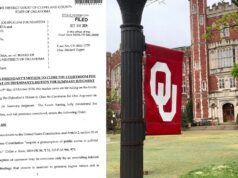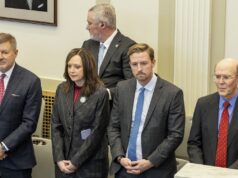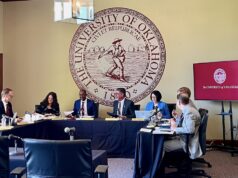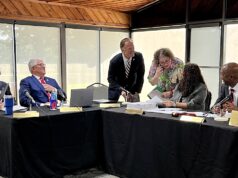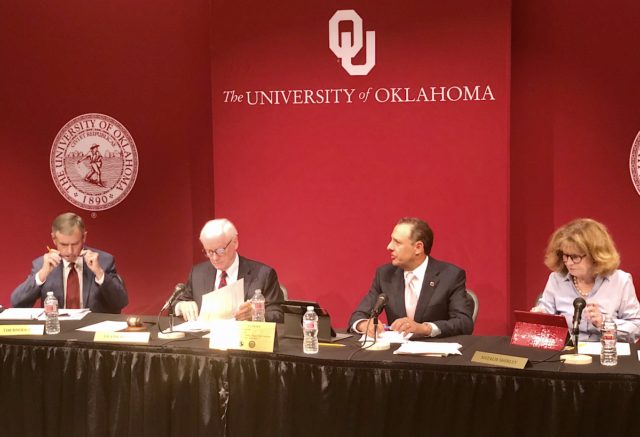

The University of Oklahoma Board of Regents returned from more than eight hours of executive session today to amend a proposed tuition increase and keep in-state tuition flat for next year. Regents also moved to modify President Joe Harroz’s contract. While final details will be negotiated, regents approved establishing a seven-year renewable term for Harroz, an annual merit payment opportunity of $100,000 and a one-time lump-sum bonus of $150,000.
Originally, Harroz’s administration had asked for a 3 percent increase to undergraduate and graduate tuition for all Norman campus students, but Regent Anita Holloway made a motion amending the proposal to make it apply only to out-of-state (or “nonresident”) students and not Oklahoma residents. New Regent Bob Ross and Regent Rick Nagel both moved to second her amendment, and the board approved it unanimously.
The board’s decision to reject the requested tuition increase on in-state students appeared to take OU administrators by surprise. Some immediately texted on their phones, and Harroz sat silently as the board voted and moved onto its final items. Minutes later, after Holloway left to catch a flight, Harroz gave remarks about the approved OU budget and attempted to praise the board’s decision while also noting his administration’s budgetary goals.
“There was a good discussion, and (the board came to) a decision that 0 percent was most appropriate right now and not 3 percent in light of the 8 percent inflation going on across the country,” Harroz said. “I appreciate this board’s perspective that we are not going to raise tuition and fees for in-state students.”
Harroz noted that the OU Board of Regents has now kept tuition and fees flat for in-state students over four of the past five years. Last year, the board approved a 2.75 percent tuition increase across the board, its first hike in four years. (Only Nagel voted against that increase.)
After Tuesday’s meeting, Harroz confirmed that he went into Tuesday afternoon’s meeting not fully knowing what the board would do regarding his request to increase tuition.
“I thought there might be an amendment, but I understand it. It’s a tough time for Oklahomans and everybody with inflation. It’s one of the reasons we have been focused on need-based scholarships,” Harroz said. “The clear belief by the board is that right now wasn’t the time to do 3 percent on in-state students and went with it for 3 percent on out-of-state students.”
Harroz, who worked for 12 years as former OU President David Boren’s general counsel, said the current OU Board of Regents’ approach to engaged governance “is healthy.”
“You don’t want a board that rubber stamps whatever the president brings, and I think that’s remarkably healthy,” Harroz said. “There’s a lot that is brought to the table. You can see from the reports they make, they put a lot of time and energy into this. There’s a reason you’ve got a board, and I think this is a great example.”
Still, his team now has to shake up the spreadsheets and rebalance next fiscal year’s budget, which had anticipated about $3 million in additional revenue from the proposed in-state tuition hike. (The out-of-state tuition hike is expected to generate about $4 million.)
“It’s a challenge. The budget was built on that. When you look at what the total number was, it was $7 million for both [in-state and out-of-state tuition increases],” Harroz said. “One thing we’ve been really careful about is budget discipline. You’ve been here when it was an issue we had to address. It gives us an additional challenge, and we will do it, we can do it, and it will be disciplined.”
OU Board of Regents Chairman Frank Keating said the current economic climate played a major role in deciding to keep in-state tuition flat.
“The general consensus was that in an inflationary time of unknown duration and debt, and with obviously the (prior tuition) increase that’s not even six-months old, we needed to pause,” Keating said after the meeting. “But obviously we’re always going to do what is best for students and the University of Oklahoma.”
Harroz offered his assessment of the board’s decision.
“It’s just a realization that how we decide what the increases should be is not just mathematical, and that’s never been the goal,” Harroz said. “We’ve had a lot of successes at the state Legislature that weren’t, honestly, predicted.”
Follow @NonDocMedia on:
Harroz: ‘I’ve got to up my contributions now’
In explaining his motion to increase Harroz’s compensation package, Regent Eric Stevenson noted a list of university advancements led by Harroz: the new OU Polytechnic Institute planned for Tulsa, the transition of all fundraising operations to the OU Foundation and the athletic conference move to the SEC.
But Stevenson said the Board of Regents has another goal in terms of the compensation of faculty and staff, who have not seen pay increases in three years.
“One of the things we are really excited about as a board is we’ve talked about for all of our faculty and staff moving to more of a performance-based incentive program, and we thought it was highly appropriate to start with the president and set the tone there,” Stevenson said.
Harroz said his current compensation package includes a $500,000 annual base salary. He said his understanding is that the $150,000 lump sum payment will reflect $50,000 for each of his three years as president so far.
“I’ve got to up my contributions now,” Harroz said, referencing charitable giving to the OU Foundation.
In reading the motion to modify Harroz’s contract, Stevenson said the bonus payment for Harroz will be “made with private funds,” also referencing fundraising from the OU Foundation.
The board is scheduled to return at 8 a.m. Friday for another extended executive session.










